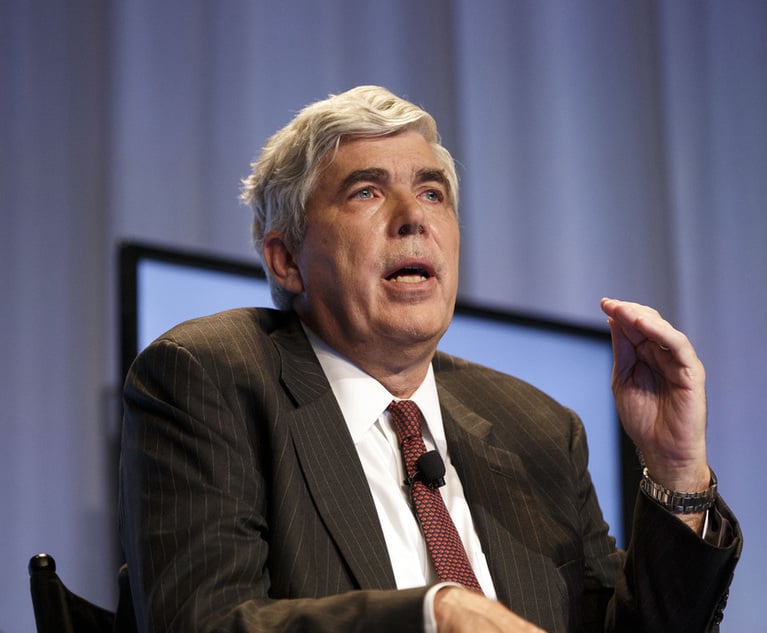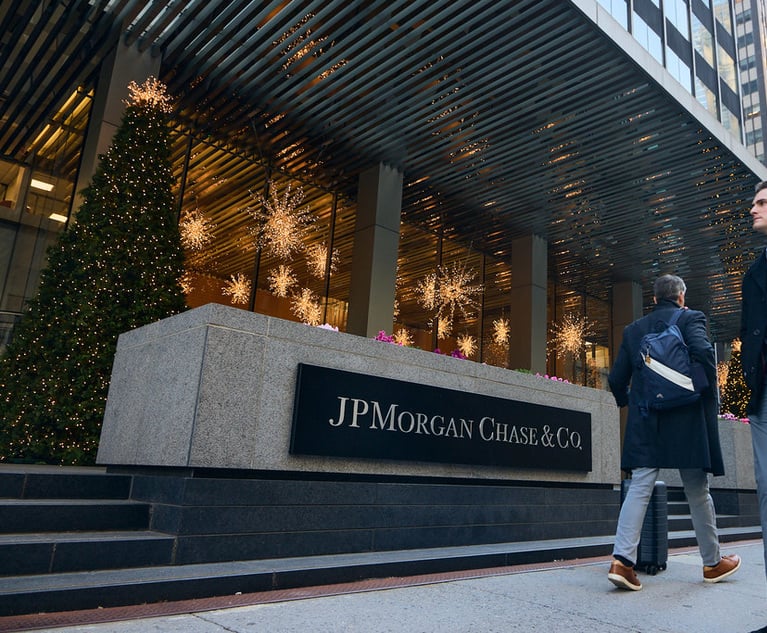Class Action Targets JPMorgan Over Alleged Illegal 'Spoofing' in Futures Markets
The technique, which Congress criminalized as part of the 2010 Dodd-Frank Wall Street Reform and Consumer Protection Act, involves placing orders to buy and sell Treasury futures to give the appearance of high market demand and artificial prices, without ever intending to execute the orders.
July 30, 2020 at 03:42 PM
3 minute read
 JPMorgan Chase & Co. office/photo courtesy of shutterstock
JPMorgan Chase & Co. office/photo courtesy of shutterstock
A class action lawsuit filed Thursday in Manhattan federal court accused JPMorgan Chase & Co. of manipulating futures markets through an outlawed trading practice to create artificial supply and demand.
The lawsuit alleged that JPMorgan, its employees and related entities for years had used a illegal strategy known as "spoofing" to drive up trading on futures contracts in order to reap "excessive profit."
The technique, which Congress criminalized as part of the 2010 Dodd-Frank Wall Street Reform and Consumer Protection Act, involves placing orders to buy and sell Treasury futures to give the appearance of high market demand and artificial prices, without ever intending to execute the orders.
According to the complaint, JPMorgan confirmed in a Feb. 25 10-K filing that it was under criminal and regulatory investigation regarding illegal market manipulation, including a probe by the Department of Justice's Criminal Division related to trading practices in the metals markets.
Beginning in 2018, the Justice Department criminally charged the head of JPMorgan's precious metals trading desk and other employees for their role in manipulating the prices of precious metals futures contracts. Two employees, John Edmonds and Christian Trunz, have since pleaded guilty and are cooperating with the ongoing federal criminal investigation, the complaint said.
In Thursday's lawsuit, Thomas Gramatis, an Illinois-based trader, said that most details of JPMorgan's trading practices in futures markets remain hidden from public view in order to protect the firm's proprietary strategies.
"Defendants also were aware that their conduct was illegal and if exposed would subject them to serious criminal and civil penalties. Accordingly, Defendants' misconduct was concealed. Discovery is likely to yield additional facts to support Plaintiff's allegations," his attorneys from Freed Kanner London & Millen in Illinois wrote in the 26-page filing.
A spokesman for JPMorgan declined to comment Thursday on the lawsuit and the pending investigations.
The suit, which alleged violations of the Commodity Exchange Act, seeks class damages on behalf of traders who dealt in Treasury futures or options on U.S. exchanges since 2009, as well as punitive and exemplary damages and interest.
Gramatis is represented by Steven A. Kanner, Douglas A. Millen and Brian M. Hogan of Freed Kanner in Bannockburn, Illinois.
The case, captioned Gramatis v. JPMorgan, has been assigned to U.S. District Judge Louis L. Stanton of the Southern District of New York.
READ MORE:
Banks Agree to $337M Settlement in Price-Fixing Case
Cardholders' Bid to Revive Class Action Suit Denied in Brooklyn Federal Court
As JP Morgan Ventures Into Cryptocurrency, a Blockchain General Counsel Spells Out What It Means
This content has been archived. It is available through our partners, LexisNexis® and Bloomberg Law.
To view this content, please continue to their sites.
Not a Lexis Subscriber?
Subscribe Now
Not a Bloomberg Law Subscriber?
Subscribe Now
NOT FOR REPRINT
© 2025 ALM Global, LLC, All Rights Reserved. Request academic re-use from www.copyright.com. All other uses, submit a request to [email protected]. For more information visit Asset & Logo Licensing.
You Might Like
View All
Private Equity Giant KKR Refiles SDNY Countersuit in DOJ Premerger Filing Row
3 minute read
Trump Mulls Big Changes to Banking Regulation, Unsettling the Industry

Trending Stories
- 1Uber Files RICO Suit Against Plaintiff-Side Firms Alleging Fraudulent Injury Claims
- 2The Law Firm Disrupted: Scrutinizing the Elephant More Than the Mouse
- 3Inherent Diminished Value Damages Unavailable to 3rd-Party Claimants, Court Says
- 4Pa. Defense Firm Sued by Client Over Ex-Eagles Player's $43.5M Med Mal Win
- 5Losses Mount at Morris Manning, but Departing Ex-Chair Stays Bullish About His Old Firm's Future
Who Got The Work
J. Brugh Lower of Gibbons has entered an appearance for industrial equipment supplier Devco Corporation in a pending trademark infringement lawsuit. The suit, accusing the defendant of selling knock-off Graco products, was filed Dec. 18 in New Jersey District Court by Rivkin Radler on behalf of Graco Inc. and Graco Minnesota. The case, assigned to U.S. District Judge Zahid N. Quraishi, is 3:24-cv-11294, Graco Inc. et al v. Devco Corporation.
Who Got The Work
Rebecca Maller-Stein and Kent A. Yalowitz of Arnold & Porter Kaye Scholer have entered their appearances for Hanaco Venture Capital and its executives, Lior Prosor and David Frankel, in a pending securities lawsuit. The action, filed on Dec. 24 in New York Southern District Court by Zell, Aron & Co. on behalf of Goldeneye Advisors, accuses the defendants of negligently and fraudulently managing the plaintiff's $1 million investment. The case, assigned to U.S. District Judge Vernon S. Broderick, is 1:24-cv-09918, Goldeneye Advisors, LLC v. Hanaco Venture Capital, Ltd. et al.
Who Got The Work
Attorneys from A&O Shearman has stepped in as defense counsel for Toronto-Dominion Bank and other defendants in a pending securities class action. The suit, filed Dec. 11 in New York Southern District Court by Bleichmar Fonti & Auld, accuses the defendants of concealing the bank's 'pervasive' deficiencies in regards to its compliance with the Bank Secrecy Act and the quality of its anti-money laundering controls. The case, assigned to U.S. District Judge Arun Subramanian, is 1:24-cv-09445, Gonzalez v. The Toronto-Dominion Bank et al.
Who Got The Work
Crown Castle International, a Pennsylvania company providing shared communications infrastructure, has turned to Luke D. Wolf of Gordon Rees Scully Mansukhani to fend off a pending breach-of-contract lawsuit. The court action, filed Nov. 25 in Michigan Eastern District Court by Hooper Hathaway PC on behalf of The Town Residences LLC, accuses Crown Castle of failing to transfer approximately $30,000 in utility payments from T-Mobile in breach of a roof-top lease and assignment agreement. The case, assigned to U.S. District Judge Susan K. Declercq, is 2:24-cv-13131, The Town Residences LLC v. T-Mobile US, Inc. et al.
Who Got The Work
Wilfred P. Coronato and Daniel M. Schwartz of McCarter & English have stepped in as defense counsel to Electrolux Home Products Inc. in a pending product liability lawsuit. The court action, filed Nov. 26 in New York Eastern District Court by Poulos Lopiccolo PC and Nagel Rice LLP on behalf of David Stern, alleges that the defendant's refrigerators’ drawers and shelving repeatedly break and fall apart within months after purchase. The case, assigned to U.S. District Judge Joan M. Azrack, is 2:24-cv-08204, Stern v. Electrolux Home Products, Inc.
Featured Firms
Law Offices of Gary Martin Hays & Associates, P.C.
(470) 294-1674
Law Offices of Mark E. Salomone
(857) 444-6468
Smith & Hassler
(713) 739-1250







